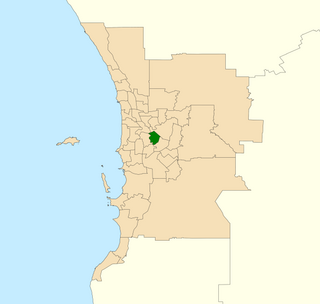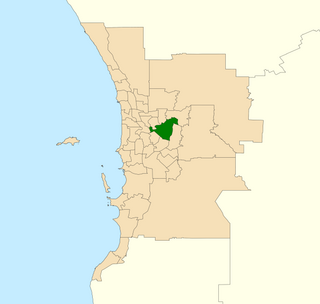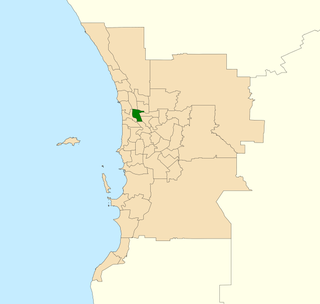Related Research Articles

John Scaddan, CMG, popularly known as "Happy Jack", was Premier of Western Australia from 7 October 1911 until 27 July 1916.
The Electoral district of Brown Hill-Ivanhoe was a Legislative Assembly electorate in the state of Western Australia. It covered part of the Goldfields city of Boulder, near Kalgoorlie, and neighbouring mining areas. It was created at the 1911 redistribution out of the former seats of Brown Hill and Ivanhoe, and was first contested at the 1911 election. It was abolished in the 1948 redistribution, with its area split between the neighbouring electorates of Boulder and Hannans, taking effect from the 1950 election. The seat was a very safe one for the Labor Party.
The Electoral district of Brown Hill was a Legislative Assembly electorate in the state of Western Australia. It was named for a local land feature, and covered part of the Goldfields city of Boulder, near Kalgoorlie. It was created at the 1904 redistribution and was merged in 1911 with the neighbouring seat of Ivanhoe to form the Electoral district of Brown Hill-Ivanhoe. The only Member for Brown Hill was Thomas Bath of the Labor Party.

The Division of Jagajaga is an Australian Electoral Division in the state of Victoria. It is located in the north-eastern suburbs of Melbourne, and lies north of the Yarra River. It covers an area of approximately 104 square kilometres and comprises the suburbs of Bellfield, Briar Hill, Diamond Creek, Eaglemont, Greensborough, Heidelberg, Heidelberg Heights, Heidelberg West, Ivanhoe, Ivanhoe East, Lower Plenty, Montmorency, Plenty, Rosanna, St Helena, Viewbank, Yallambie, Watsonia and Watsonia North; and parts of Bundoora, Eltham, Eltham North, Hurstbridge, Macleod, Wattle Glen and Yarrambat.

The 1911 New Zealand general election was held on Thursday, 7 and 14 December in the general electorates, and on Tuesday, 19 December in the Māori electorates to elect a total of 80 MPs to the 18th session of the New Zealand Parliament. A total number of 590,042 (83.5%) voters turned out to vote. In two seats there was only one candidate.

The Electoral district of Victoria Park is a Legislative Assembly electorate in the state of Western Australia. Victoria Park is named for the inner southeastern Perth suburb of Victoria Park, which falls within its borders.

Belmont is an electoral district of the Legislative Assembly in the Australian state of Western Australia. Belmont is named for the inner eastern Perth suburb of Belmont, which falls within its borders.

The electoral district of Pilbara is a Legislative Assembly electorate in the state of Western Australia. Pilbara is named for the region of Western Australia in which it is located. It is one of the oldest electorates in Western Australia, with its first member having been elected to the Second Parliament of the Legislative Assembly at the 1894 elections.

Balcatta is an electoral district of the Legislative Assembly in the Australian state of Western Australia.

Maylands is a Legislative Assembly electorate in the state of Western Australia. Maylands is named for the inner northeastern Perth suburb of Maylands, which falls within its borders.

Nedlands is a Legislative Assembly electorate in the state of Western Australia. Nedlands is named for the inner western Perth suburb of Nedlands, which falls within its borders.

The Electoral district of Perth is a Legislative Assembly electorate in the state of Western Australia. Perth is named for the capital city of Western Australia whose central business district falls within its borders. It is one of the oldest electorates in Western Australia, with its first member having been elected in the inaugural 1890 elections of the Legislative Assembly.

Collie-Preston is a Legislative Assembly electorate in the state of Western Australia. While the seat was known as Collie for just over a century of its existence as an electorate, the seat was known as South West Mining from 1901 to 1904, and Collie-Wellington from 2005 to 2008. It is named for the South West coal mining town of Collie. While historically a very safe seat for the Labor Party, redistributions in 1988 and 2007 due to increases in the quota for country seats which had historically been malapportioned resulted in the seat incorporating surrounding rural shires which were hostile to Labor and thereby becoming more marginal.
The 2006 Victoria Park state by-election was a by-election held on 11 March 2006 for the Western Australian Legislative Assembly seat of Victoria Park in the inner southeastern suburbs of Perth.
Mount Marshall was an electoral district of the Legislative Assembly in the Australian state of Western Australia from 1930 to 1989.
The electoral district of Canning was an electorate in the state of Western Australia. The electorate, which was named for the Canning River which ran through it, was first contested at the 1897 election, but was abolished prior to the 1901 election, with most of its territory transferred to the new seat of South Perth. However, for the 1904 election, South Perth was abolished and Canning re-created. Canning was abolished for a second time in the 1988 redistribution.

Mount Lawley is an electorate in the state of Western Australia. Mount Lawley is named for the inner north-eastern Perth suburb of Mount Lawley, which falls within its borders.
This is a list of members of the Western Australian Legislative Assembly between the 1930 election and the 1933 election, together known as the 14th Parliament. It took place under radically altered boundaries as enacted within the Redistribution of Seats Act 1929, whose effect had been exaggerated by the lack of a redistribution for the previous 18 years. The gold mining areas, populous at the time of the 1911 redistribution, had been reduced to pocket boroughs by the decline in gold mining as an economic activity in the State; meanwhile, the agricultural and metropolitan areas had grown substantially. Ironically, the changes were enacted by a Labor government even though most of the safe seats being abolished were Labor seats—and for the fourth time in a row, the government enacting the redistribution lost the subsequent election.
The 1982 Nedlands state by-election was a by-election held on 13 March 1982 for the Western Australian Legislative Assembly seat of Nedlands in the western suburbs of Perth.
References
- ↑ Government of Western Australia (1904). "Redistribution of Seats Act (No 21 of 1904)". Statutes of Western Australia, 1903-1904. pp. 515–540. Assented 16 January 1904.
- ↑ Government of Western Australia (1911). "Redistribution of Seats Act (No 6 of 1911)". Statutes of Western Australia, 1910-1911. pp. 73–106. Assented 16 February 1911.
- ↑ Mandy, John (2002). The Western Australian Parliamentary Handbook (20th ed.). Perth: Parliament of Western Australia.